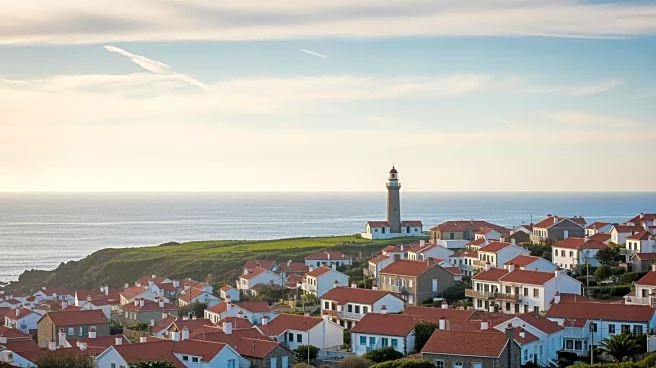What's Happening?
Officials and residents of Grindavík have expressed disapproval of a BBC report that inaccurately described the town as 'Iceland’s ghost town buried by lava.' The report, shared widely on social media,
claims that visitors can take guided tours through areas supposedly buried under lava following eruptions on the Reykjanes Peninsula in November 2023. Ásrún Kristinsdóttir, president of the municipal council, labeled the coverage as 'sad and misleading,' emphasizing that life in Grindavík continues despite recent challenges. Hjálmar Hallgrímsson, town council chair, also refuted the portrayal, noting that only about 80 of the town's 1,200 homes remain uninhabitable. He sarcastically remarked on the report's credibility, highlighting the town's active daily life and tourism.
Why It's Important?
The BBC's portrayal of Grindavík as a ghost town could have significant implications for the local community and its economy. Such reports may deter tourists, impacting the town's tourism industry, which is vital for its economic recovery and growth. Misleading descriptions can also affect community morale, as residents strive to rebuild and maintain normalcy after natural disasters. Accurate media representation is crucial for supporting local economies and ensuring that potential visitors have a true understanding of the region's current state and attractions.
What's Next?
Local officials are likely to continue addressing inaccuracies in media reports to protect Grindavík's reputation and promote tourism. Efforts to rebuild and attract visitors to the Reykjanes Peninsula, known for its geothermal sites and natural beauty, will persist. The community may engage in campaigns to highlight the town's resilience and ongoing recovery, aiming to counteract any negative perceptions caused by misleading media coverage.
Beyond the Headlines
The controversy underscores the broader issue of media responsibility in accurately reporting on communities affected by natural disasters. It highlights the ethical obligation of news organizations to verify facts and consider the impact of their narratives on local populations. This situation may prompt discussions on improving journalistic standards and fostering collaboration between media outlets and local authorities to ensure truthful reporting.









